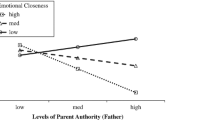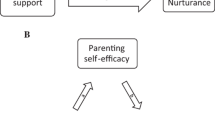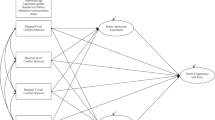Abstract
Objectives
Examined the influences of parent-grandparent coparenting relationship on young children’s social competence, and the potential mediating role of maternal parenting self-efficacy between them in Chinese urban families.
Methods
A two-wave longitudinal study was conducted. A total of 317 young children’s mothers participated in Wave 1, 179 of the 317 participants participated in Wave 2 six months later. Mothers completed scales of parent-grandparent coparenting relationship, maternal parenting self-efficacy, and children’s social competence in Wave 1 and reported their children’s social competence again six months later.
Results
Structural equation modeling with a bootstrap resample of 1000 indicated: (a) the cross-sectional study showed that maternal strategies efficacy (ab = .06, 95% confidence interval [CI] = [.02, .10], p = .006) and child outcome efficacy (ab = .14, 95% CI = [.01, .08], p = .002) partially mediated the effect of parent-grandparent coparenting relationship and children’s social competence. (b) the six-month follow-up study showed that child outcomes efficacy totally mediated the relationship between parent-grandparent coparenting relationship and children’s social competence (ab = .07, 95% CI = [.03, .12], p = .003).
Conclusions
These findings highlight the contribution of the harmonious parent-grandparent coparenting relationship and maternal parenting self-efficacy to young children’s socialization and are discussed in light of family systems theory and the ecological model of coparenting.


Similar content being viewed by others

References
Abarashi, Z., Tahmassian, K., Mazaheri, M. A., Panaghi, L., & Mansoori, N. (2014). Parental self-efficacy as a determining factor in healthy mother-child interaction: a pilot study in Iran. Iranian Journal of Psychiatry and Behavioral Sciences, 8(1), 19–25.
Akhtar, P., Malik, J. A., & Begeer, S. (2017). The grandparents’ influence: parenting styles and social competence among children of joint families. Journal of Child and Family Studies, 26(2), 603–611.
Baker, J., McHale, J., Strozier, A., & Cecil, D. (2010). Mother-grandmother coparenting relationships in families with incarcerated mothers: a pilot investigation. Family Process, 49(2), 165–184.
Bandura, A. (1997). Self-efficacy: the exercise of control. New York: Freeman.
Bandura, A. (1989). Regulation of cognitive processes through perceived self-efficacy. Developmental Psychology, 25(5), 729–735.
Barnett, M. A., Mills-Koonce, W. R., Gustafsson, H., & Cox, M. (2012). Mother-Grandmother conflict, negative parenting, and young children’s social development in multigenerational families. Family Relations, 61(5), 864–877.
Barnett, M. A., Scaramella, L. V., McGoron, L., & Callahan, K. (2011). Coparenting cooperation and child adjustment in low-income mother-grandmother and mother-father families. Family Science, 2(3), 159–170.
Barnett, M. A., Scaramella, L. V., Neppl, T. K., Ontai, L. L., & Conger, R. D. (2010). Grandmother involvement as a protective factor for early childhood social adjustment. Journal of Family Psychology, 24(5), 635–645.
Barnett, M. A., the Family Life Project Key Investigators. (2008). Mother and grandmother parenting in low-income three generation rural households. Journal of Marriage and Family, 70(5), 1241–1257.
Bloomfield, L., & Kendall, S. (2012). Parenting self-efficacy, parenting stress and child behaviour before and after a parenting programme. Primary Health Care Research and Development, 13(4), 364–372.
Chen, W. C. (2016). The role of grandparents in single-parent families in Taiwan. Marriage and Family Review, 52(1-2), 41–63.
China Research Center on Aging (2012). A compilation of survey data on the system of elderly support for the elderly in China. Vol. 132. Beijing, China: Huangling Press.
Coleman, P. K., & Karraker, K. H. (2000). Parenting self-efficacy among mothers of school-age children: Conceptualization, measurement, and correlates. Family Relations, 49(1), 13–24.
Coleman, P. K., & Karraker, K. H. (2010). Maternal self-efficacy beliefs, competence in parenting, and toddlers’ behavior and developmental status. Infant Mental Health Journal, 24(2), 126–148.
Elder, G. H., Eccles, J. S., Ardelt, M., & Lord, S. (1995). Inner city parents under economic pressure: perspectives on the strategies of parenting. Journal of Marriage and the Family, 57(3), 771–784.
Feinberg, M. E. (2003). The internal structure and ecological context of coparenting: a framework for research and intervention. Parenting: Science and Practice, 3(2), 95–131.
Fergusson, E., Maughan, B., & Golding, J. (2008). Which children receive grandparental care and what effect does it have? Journal of Child Psychology and Psychiatry, 49(2), 161–169.
Gao, L., Sun, K., & Chan, S. W. (2014). Social support and parenting self-efficacy among Chinese women in the perinatal period. Midwifery, 30(5), 532–538.
Giallo, R., Treyvaud, K., Cooklin, A., & Wade, C. (2013). Mothers’ and fathers’ involvement in home activities with their children: psychosocial factors and the role of parental self-efficacy. Early Child Development and Care, 183(3–4), 343–359.
Goh, E. C. L. (2006). Raising the precious single child in urban China: an intergenerational joint mission between parents and grandparents. Journal of Intergenerational Relationships, 4(4), 6–28.
Goh, E. C. L., & Kuczynski, L. (2010). Only children and their coalition of parents: considering grandparents and parents as joint caregivers in urban Xiamen, China. Asian Journal of Social Psychology, 13(4), 221–231.
Guo, X. (2014). The influence of grandparenting on cognitive development among children: a longitudinal study. Chinese Journal of Clinical Psychology, 22(6), 1072–1076+1081.
Holloway, S. D., Campbell, E. J., & Nagase, A., et al. (2016). Parenting self-efficacy and parental involvement: Mediators or moderators between socioeconomic status and children’s academic competence in Japan and Korea? Research in Human Development, 13(3), 258–272.
Jia, R., & Schoppe-Sullivan, S. J. (2011). Relations between coparenting and father involvement in families with preschool-age children. Developmental Psychology, 47(1), 106–118.
Jones, T. L., & Prinz, R. J. (2005). Potential roles of parental self-efficacy in parent and child adjustment: a review. Clinical Psychology Review, 25(3), 341–363.
Junttila, N., Vauras, M., & Laakkonen, E. (2007). The role of parenting self-efficacy in children’s social and academic behavior. European Journal of Psychology of Education, 22(1), 41–61.
King, V., & Elder, Jr, G. H. (1997). The legacy of grandparenting: childhood experiences with grandparents and current involvement with grandchildren. Journal of Marriage and Family, 59(4), 848–859.
LaFreniere, P. J., & Dumas, J. E. (1996). Social competence and behavior evaluation in children ages 3 to 6 years: The short form (SCNE–30). Psychological Assessment, 8(4), 369–377.
Lavers, C. A., & Sonuga-Burke, E. J. (1997). Annotation: on the grandmothers’ role in the adjustment and maladjustment of grandchildren. Journal of Child Psychology and Psychiatry, 38(7), 747–753.
LeRoy, M., Mahoney, A., Pargament, K. I., & DeMaris, A. (2013). Longitudinal links between early coparenting and infant behaviour problems. Early Child Development and Care, 183(3–4), 360–377.
Lesniowska, R., Gent, A., & Watson, S. (2016). Maternal fatigue, parenting self-efficacy, and over reactive discipline during the early childhood years: a test of a mediation model. Clinical Psychologist, 20(3), 109–118.
Li, X., & Wei, X. (2017). Father involvement and children’s social competence: Mediating effects of maternal parenting self-efficacy. Journal of Beijing Normal University, 62(5), 49–58.
Liang, Z., Zhang, A., Zhang, G., Song, Y., Deng, H., & Lu, Z. (2013). A longitudinal study on relations between parents’ marital quality and children’s behavior problems: moderating effect of children’s effortful control. Psychological Development and Education, 5, 525–532.
Liu, Y., Song, Y., Liang, Z., Bai, Y., & Deng, H. (2012). Evaluation of social competence and behavior of urban children in China. Journal of Southeast University, 31(3), 268–273.
Liu, Y., & Zhao, Z. (2013). Effects of grandparenting on preschool children’s emotion regulating strategies. Studies in Preschool Education, 2, 37–42.
McHale, J., Lauretti, A., Talbot, J., & Pouquette, C. (2002). Retrospect and prospect in the psychological study of coparenting and family group process. In J. P. McHale & W. S. Grolnick (Eds.), Retrospect and prospect in the psychological study of families. (pp. 127–166). Mahwah: Lawrence Erlbaum Associates.
MacKinnon, D. P., Lockwood, C. M., Hoffman, J. M., West, S. G., & Sheets, V. (2002). A comparison of methods to test mediation and other intervening variable effects. Psychological Methods, 7(1), 83–104.
Majdandžić, M., Vente, W. D., Feinberg, M. E., Akta, E., & Bögels, S. M. (2012). Bidirectional associations between coparenting relations and family member anxiety: a review and conceptual model. Clinical Child and Family Psychology Review, 15(1), 28–42.
Minuchin, P. (1988). Relationships within the family: A systems perspective on development. In R. Hinde & J. Stevenson-Hinde (Eds.), Relationships within families: Mutual influences (pp. 7–26). Oxford, England: Clarendon Press.
Mouton, B., & Roskam, I. (2015). Confident mothers, easier children: a quasi-experimental manipulation of mothers’ self-efficacy. Journal of Child and Family Studies, 24(8), 2485–2495.
Nagase, A. (2015). Revealing the pathway from couple relationship to children’s social competence: the role of life stress, parenting self-efficacy, and effective parenting. Berkeley: University of California. Unpublished doctoral dissertation.
National Statistical Bureau of the People’s Republic of China. (2018). Statistical Bulletin of the People’s Republic of China on National Economic and Social Development in 2017. http://www.stats.gov.cn/tjsj/zxfb/201802/t20180228_1585631.html
Pittman, L. D., & Boswell, M. K. (2007). The role of grandmothers in the lives of preschoolers growing up in urban poverty. Applied Developmental Science, 11(1), 20–42.
Poblete, A. T., & Gee, C. B. (2018). Partner support and grandparent support as predictors of change in coparenting quality. Journal of Child and Family Studies, 27(7), 2295–2304.
Podsakoff, P. M., MacKenzie, S. B., Lee, J., & Podsakoff, N. P. (2003). Common method biases in behavioral research: A critical review of the literature and recommended remedies. Journal of Applied Psychology, 88(5), 879–903.
Preacher, K. J., & Hayes, A. F. (2008). Asymptotic and resampling strategies for assessing and comparing indirect effect in multiple mediator models. Behavior Research Methods, 40(3), 879–891.
Roskam, I., Brassart, E., Loop, L., Mouton, B., & Schelstraete, M. (2016). Do parenting variables have specific or widespread impact on parenting covariates? The effects of manipulating self-efficacy or verbal responsiveness. Child and Family Behavior Therapy, 38(2), 142–163.
Settles, B. H., Zhao, J., Mancini, K. D., Rich, A., Pierre, S., & Oduor, A. (2009). Grandparents caring for their grandchildren: Emerging roles and exchanges in global perspectives. Journal of Comparative Family Studies, 40(5), 827–848.
Suzuki, S., Holloway, S. D., Yamamoto, Y., & Mindnich, J. D. (2009). Parenting self-efficacy and social support in Japan and the United States. Journal of Family Issues, 30(11), 1505–1526.
Teun, G., Theo, V. T., Anne-Rigt, P., & Dykstra, P. A. (2015). Child care by grandparents: changes between 1992 and 2006. Ageing and Society, 35(6), 1318–1334.
Van Egeren, L. A., & Hawkins, D. P. (2004). Coming to terms with coparenting: implications of definition and measurement. Journal of Adult Development, 11(3), 165–178.
Wilson, S. R., Gettings, P. E., Guntzviller, L. M., & Munz, E. A. (2014). Parental self-efficacy and sensitivity during playtime interactions with young children: unpacking the curvilinear association. Journal of Applied Communication Research, 42(4), 409–431.
Acknowledgements
The study was supported by a grant from the National Social Science Foundation of China (Grant No. 15CSH053): Parent-grandparent coparenting in urban families and its influence on young children’s social adjustment. We wish to thank the families who volunteered for the study for their time and effort. This study was funded by National Social Science Foundation of China (Grant No. 15CSH053) to Xiaowei Li.
Author Contributions
L.X.: designed and executed the study, assisted with the data analyses, and wrote the paper. L.Y.: analyzed the data and wrote part of the results.
Author information
Authors and Affiliations
Corresponding author
Ethics declarations
Conflict of Interest
The authors declare that they have no conflict of interest.
Ethical Approval
All procedures performed in studies involving human participants were in accordance with the ethical standards of Beijing Normal University and/or national research committee and with the 1964 Helsinki declaration and its later amendments or comparable ethical standards.
Informed Consent
Informed consent was obtained from all individual participants included in the study.
Additional information
Publisher’s note: Springer Nature remains neutral with regard to jurisdictional claims in published maps and institutional affiliations.
Rights and permissions
About this article
Cite this article
Li, X., Liu, Y. Parent-Grandparent Coparenting Relationship, Maternal Parenting Self-efficacy, and Young Children’s Social Competence in Chinese Urban Families. J Child Fam Stud 28, 1145–1153 (2019). https://doi.org/10.1007/s10826-019-01346-3
Published:
Issue Date:
DOI: https://doi.org/10.1007/s10826-019-01346-3



